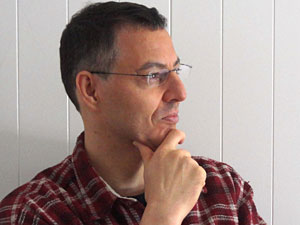


Before arguing whether chess is a sport and athletics, let’s first do away with the formalism:
According to (Norwegian) Wikipedia, “athletics” (“idrett”, from old Norse, “id”, work or activity and “drott”, power, strength or perseverance), in addition to bodily or physical accomplishments, which govern contemporary understanding, originally referred to all forms or expressions of highly regarded skills like music, poetry and knowledge of runes. While athletics emphasises the athletes’ efforts and control of the body (skiing, skating, boxing, tennis, handball and football), sports, meaning "anything humans find amusing or entertaining”, at the same time appreciate the use of facilities, equipment, tools, devices, means of transport or animal as a basic condition (sailing, equestrianism and motor racing). Today the concepts are more often used interchangeably.
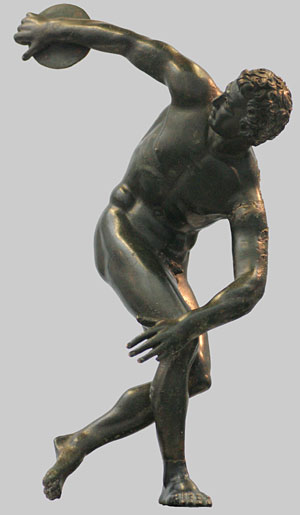
To begin with, we might say that all sports or athletic sports belonging under the Wikipedian definition amount to being “only” “play” or “a game” since these are ruled based activities. Claiming chess “is just a game”, because it is rule based, and therefore unworthy of undue attention, is a tautology and explains nothing. Mind you, the activity we call life may also be perceived to be a game with rules and recipes. When asking if chess is a sport or athletics, what we’re really asking is if chess players perform, and more so, in the physical sense of the word.
When Børre Rognlien, president or chairman of the Norwegian Athletic Association (NIF) and Widar Fossum, former vice president of the Norwegian Chess Federation (NSF) state that chess is not athletics because the NSF is not a member of the NIF, this is self-contradictory. The NSF not being a member of the NIF merely goes to show that the NSF is not a member of the NIF, not that chess in and of itself is not athletics.
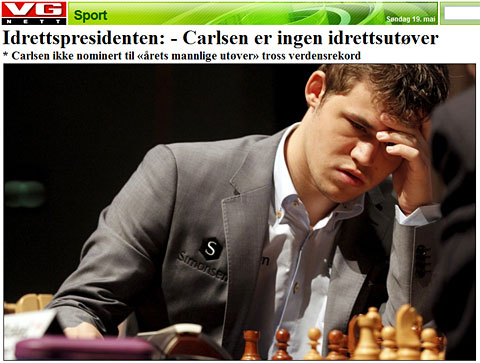
"Sports president: - Carlsen is not an athlete" says Børre Rognlien in this VG article, explaining why the country's and world's best chess player was not nominated for the male athlete of the year award
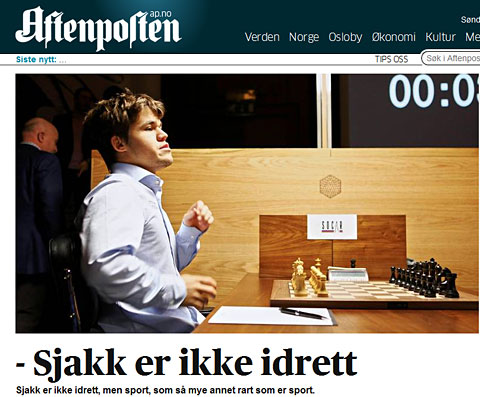
"Chess is not a sport" says this
article in the Norwegian newspaper Aftenposten,
which has at the time of writing 65 readers commenting
Despite agreeing in newspapers’ commentary fields that games and activities like chess, bridge, archery, dart, shooting etc., involve performance of some kind, still, the physical aspect seems to saturate contemporary understanding of what a sporting or athletic performance is. In a country obsessed with countables and quantifiables – what cannot be measured does not exist – we may ask if not the accent on the physical excludes the possibility for a finer perception of what “performance” or “achievement” might be. Few doubt mental gladiators perform, but what, where and how? Is “blood, sweat and tears” (Johan Kaggestad, Norwegian athletics coach and TV commentator) or “motion” (1500-meter runner, Henrik Ingebrigtsen) the only criterion in a sporting or athletic performance or achievement?
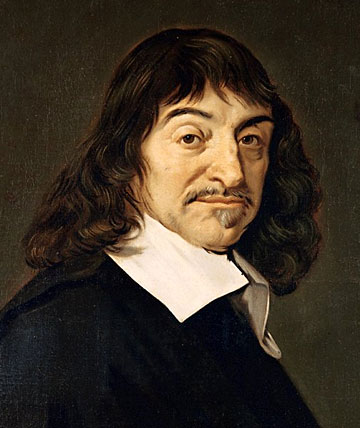
The prevalent preference for the physical may be argued to be grounded in the still deeply rooted Cartesian (after René Descartes, 1596-1650, above in a Frans Hals painting) dualism matter (body) vs mind (soul), representing two ontologically separate categories impossible to combine into a higher unity.
Not until Maurice Merleau-Ponty (1908-1961), in his Phenomenology of Perception (1945), suggested that we know, experience and are-in-the-world rather through our body, consciousness (cogito) was perceived as the primary source of knowledge and experience, and the body a mere appendage. While philosophy and religion emphasise the mind rather than the body, Ponty reminds us that the brain (still) is part of the body (sic!) and thus relaunches or reintroduces man as a homogenous unity consisting both of mind and matter, body and soul, mutually interdependent.
Just as religion and philosophy ignore the corporeal significance for knowledge and experience, Rognlien and Ingebrigtsen, in their emphasis of physical motion, go to the opposite extreme and accentuate the body at the expense of the brain, as if arms and legs move all by themselves.
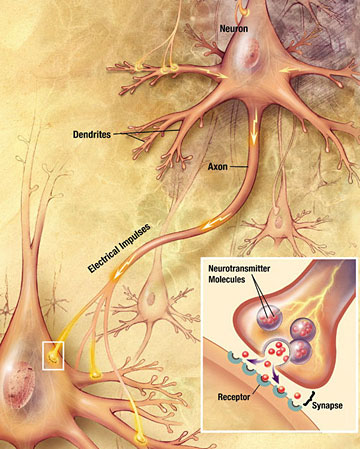
Image: Wiki, courtesy of National Institutes of Health
However, today we know that any corporeal motion starts off with electric impulses subconsciously triggered in the oubliettes of the brain. The brain, which processes a 100 million million (0.1 quadrillion) instructions per second (in daily activities), and the speed of thought clocked at somewhere between 0.5-100 m/s (between 550 and 750 milliseconds for the information or perception of something to reach the brain and to be comprehended and interpreted), testify to motion. Since external corporeal motion, arms and legs, depends on internal cerebral motion, it is not yet clear why external corporeal motion should weigh heavier concerning the definition of sports or athletics.
In other words, there is no principal difference between Magnus lifting his arm and sacking a knight or Petter (Northug, Norwegian cross-country skier) using his poles to stroke himself forward; both actions spring from subconsciously triggered impulses in the brain. Strokes and chess moves have the same source. And voila! We have compared apples with oranges!
We may therefore conclude that the definitions of sports and athletics are not based on what is really going on but on what we observe, and stem from a time before organised tournament chess and insights into the brain. We see arms and legs but not neurons and synapses.
As long as different activities yield different reactions, even if lowest common multiples may be found, “corporeal or physical performance” as a criterion on whether you do athletics or not, appears irrelevant because at times we do have “one of those days” and definitions do not depend on our day-to-day condition. Are those with the most “blood, sweat and tears” the greatest athletes? What if you die on the playing field or during physical exertion? If not, we have to grade and define corporeal performance and where to draw the line? Do physical or bodily performances or skills lend themselves to precise defining or grading? Since measuring or quantifying chess skills and chess knowledge is impossible, the rating system is our best shot. What, then, makes for a decent rating? Magnus’ latest peak? And how to decide which activities and disciplines merit to be recognised as athlethics (idrett)? In the days of yore, music, poetry and runes, but today?
To play chess, professionally or not may be compared to studying for and taking an exam. Chess players are graduating all the time, before, under and after tournaments. Professionals work on their chess between 7-8 hours a day and perform theoretically, practically, mentally and physically. They practice different types of positions; openings, middlegames and endgames. They work on their tactics (reflexes and intuition) and scrutinise positions to improve their positional feeling and ability to calculate variations, i.e. visualising sequences of moves. During the game they worry about their preparations (do I remember them and are they good enough?), the result of the game, their opponent for the next round and the outcome of the tournament. They have to be red alert (“Beware! The man on the other side, has bad intentions”, Bent Larsen) and keep their calm in attack as well as in defence. They worry if they can win good positions against stronger opposition and must take care not to underestimate lower rated opponents. They get headaches and sleep poorly while the mind grinds out today’s game.
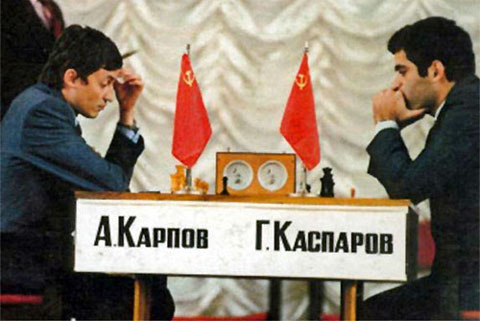
All this mental tension and exertion manifests itself physically – well known is Karpov’s ten kilos weight loss during his World Championship match against Kasparov in 1984/85 – and that the young replace the old. Just like our experience of headaches hinges on material prerequisites, chess players’ experience of physical fatigue depends on neural collaboration during strain and therefore makes it difficult with regard to the definition of sports or athletics to argue why more traditional physical exertion should weigh heavier than chess players’ fatigue resulting from strong concentration over time (in studies as well as in tournament play).
Kaggestad mentions the competitive aspect as essential to whether something qualifies as a sport and, we may add, the competitive aspect transforms (any) activity into sport, if not necessarily into athlethics. According to Wikipedia, chess may therefore be a sport and athletics due to physical exertion (more so during tournaments than casual games), possible use of some device, tool or equipment and scoring points; 1 for a win, ½ for a draw and 0 for a loss. Thus, the definition also covers blindfold chess, where players exchange only the coordinates while playing. The expression “to become a sport” precisely ties the competitive aspect to the concept of sports, since we do not say “to become athletics”, suggesting you may exercise athletics without competing or scoring points. Since use of equipment, tools or devices is possible but not imperative, the competitive aspect appears more relevant to whether chess qualifies as a sport. By scoring points, one exerts oneself more, because more “is at stake” – Gadamer.
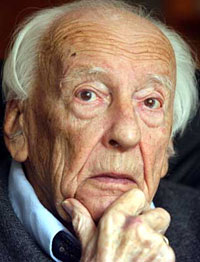
|
Hans Georg Gadamer’s philosophical hermeneutics or theory of interpretation, formulated in his magnum opus, Truth and Method, 1960, deals with how we, through our prejudices, expectations and presuppositions, “encounter” a work of art, say a painting or a text, and where this encounter jeopardises our understanding or interpretative framework, even if the painting is merely hanging on the wall. Think of a painting or a text that annoyed you. Congratulations, you’ve been played. A more convoluted point of bringing Gadamer into the discussion is that something may be at stake for both those who claim chess is a sport and those who claim chess is “just a game.” |
The debate over whether chess is a sport and/or athletics (idrett) or “just a game”, may be more significant than what first meets the eye, and as in so many other contexts, it’s all about money. Doing sports or athletics is considered desirable, with athletes serving as examples and role models. Sports and athletics are thought to develop a host of qualities, attributes and characteristics, e.g. team spirit, perseverance, ability to plan/analyse and carry out, not to mention the noble art of defeat, i.e. it’s not the winning that counts but the taking part etc. If chess, as we have seen, lends itself to be defined as sports and athletics, chess may attract substantially increased commercial attention (read: sponsorships).
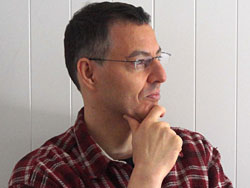 |
Born in 1968, Rune Vik-Hansen graduated from the
University of Tromsø in 1999 with a thesis on Heidegger's concept of
Dasein. Other fields of interests are metaphysics, ontology, theory
of science and political ethics. Besides having worked as a teacher on different levels, Vik-Hansen also writes philosophical texts, chronicles, papers and essays as well as children’s literature. He is currently actively involved as a mentor on writing, philosophy and chess projects with school children in New York City. |